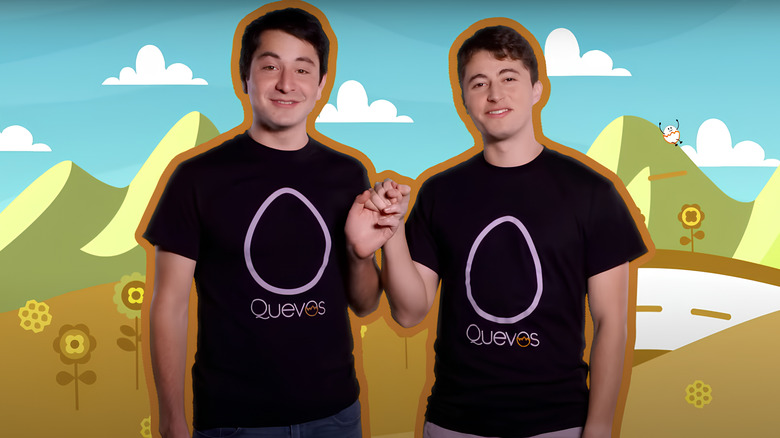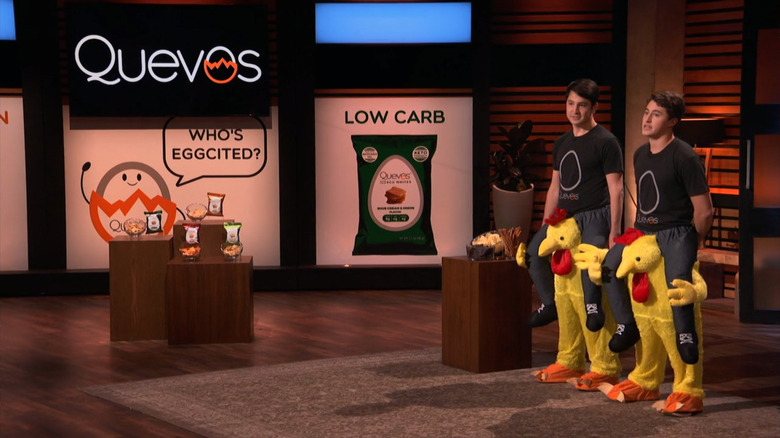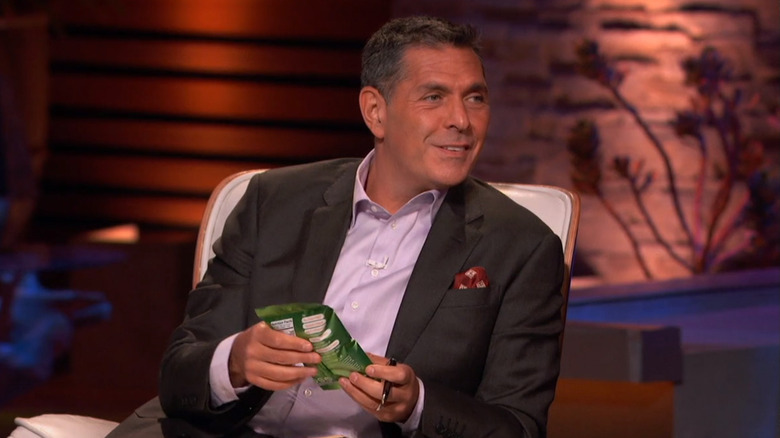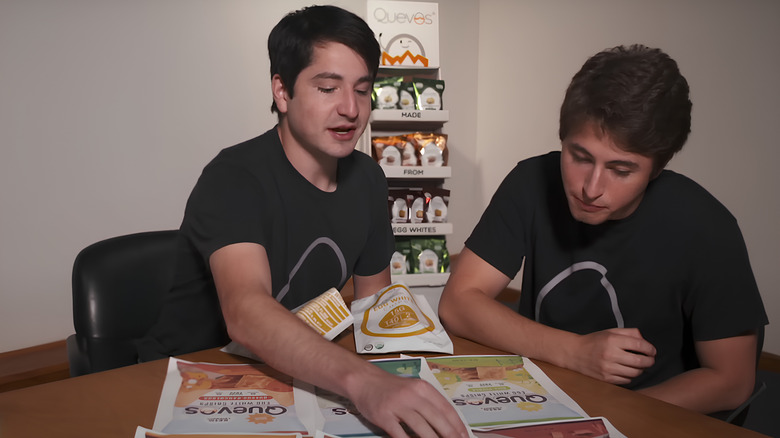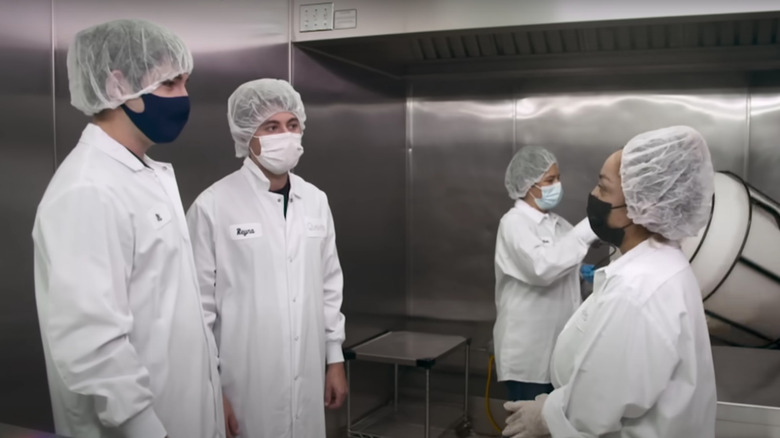Whatever Happened To Quevos After Shark Tank?
The Sharks on "Shark Tank" don't discriminate when it comes to food-related products. Decadent snacks like Wicked Good Cupcakes are as good of an investment opportunity as health foods like Pan's Mushroom Jerky. Some consumers, however, don't have the luxury of eating whatever they want. For Quevos co-founder Zack Schreier, a childhood Type 1 diabetes diagnosis severely restricted his ability to binge on junky snack foods. "I went from being a kid who loved to snack all the time...to being somebody that had to watch every single carb that I put into my body," he said on "Shark Tank."
One day when he was making an omelet, Schreier noticed the edges of the egg crisping up into a lacy, crunchy texture. He thought, "Maybe I could make a chip out of this." Eight years later, he and his friend Nick Hamburger got to work on the egg white-based chips.
The result, Quevos, is the rare snack food item that's both good and good for you. In their Season 12 "Shark Tank" appearance, the duo brought samples of the snacks in several flavors: cheddar, sweet barbecue, sour cream and onion, and dill pickle. According to Schreier and Hamburger's pitch, with about four grams of fiber and eight grams of protein per serving, Quevos are more satiating and nourishing than your average chip. It was the company's other numbers, however, that convinced the Sharks to take a bite.
The Sharks were egg-cited for Quevos
Zack Schreier and Nick Hamburger entered the shark tank seeking $200,000 for a 5% stake in Quevos, and they had the numbers to back up their steep valuation. The duo launched Quevos as college students in 2018 and raised nearly $72,000 on Kickstarter. They had also received additional financial backing courtesy of Kraft Heinz's incubator program, Springboard.
In 2019, the snack behemoth selected Quevos as part of their inaugural incubator class, making them the only pre-revenue company to be accepted to the program. Schreier and Hamburger received $50,000 in funding, as well as indispensable mentorship. A few months after leaving Springboard, Quevos began cropping up in a dozen Chicagoland stores.
Sales in the first year were strong, totaling $260,000. Seven months through its second year, Quevos had netted $660,000, putting the company on pace for $1.3 million in lifetime sales at the time of their "Shark Tank" appearance — an impressive feat for two 22-year-olds. "I think you guys are probably two of the youngest, most impressive people we've ever had out here," said Robert Herjavec, who was won over by the duo's ambition and business savvy. Even after he dropped out, he relished in seeing the pair negotiate with the other Sharks. "It's a pleasure watching you guys," he said.
Schreier and Hamburger engaged in a lengthy back-and-forth between Kevin O'Leary and Daniel Lubetzky, with O'Leary (in true Mr. Wonderful fashion) attempting to place a royalty charge on each bag of chips. Ultimately, the entrepreneurs accepted Lubetzky's deal for $200,000 for 10% equity, plus a $200,000 line of credit.
Quevos and Daniel Lubetzky were a match made in snack heaven
After securing a deal with Daniel Lubetzky, Nick Hamburger and Zack Schreier revealed that they were thrilled to pair up with the Shark. "We were looking for an experienced partner who knew the food industry," Hamburger said in a Season 13 update. "We couldn't have been more excited to partner with Daniel, who's a giant in our industry and has been helping us every step of the way." Lubetzky is the founder and executive chairman of Kind LLC, the snack company best known for its line of fruit and nut-based protein bars, which is valued at $5 billion.
For his part, Lubetzky said he's just as excited to work with a couple young industry upstarts. "What's fun about working with Nick and Zack is that I have, like, 20-plus years of painful mistakes." he said in the same update segment. "I'm able to teach them how to overcome and avoid those mistakes and just grow faster, better, cleaner."
Lubetzky has been an invaluable mentor for the Quevos co-founders, both in terms of his experience and his financial generosity. In the update segment, Lubetzky surprised Schreier and Hamburger with an additional $1,350,000 investment in Quevos.
Quevos' sales have skyrocketed
Daniel Lubetzky's mentorship and additional investment paid off, and the post- "Shark Tank" attention didn't hurt either. In the two weeks after Nick Hamburger and Zack Schreier's "Shark Tank" appearance in 2021, Quevos netted $500,000 in sales. Within eight months, the company's lifetime sales grew to $3.2 million.
With the hefty cash infusion, Quevos was able to expand its staff and production facility. The egg-based chips can be found in 1500 stores nationwide, including Puerto Rico. Quevos retails at Whole Foods, Wegman's, The Vitamin Shoppe, Mariano's, Sprouts, and Albertsons, as well as on the Quevos website and Amazon. The company has also expanded its variety of flavors to include honey mustard.
Hamburger admits that he has grown as a business owner, too. In an interview with Billion Success, the young CEO revealed that he once hired two college friends to work with him, to the detriment of their relationship. "Because we were friends, I withheld a lot of the feedback that they needed to hear to improve in their roles. Instead of being transparent with them to give them a chance to succeed, I fired them," he said. "I've since learned to become a better manager by providing constructive feedback on the way."
For their efforts, Hamburger and Schreier were selected as part of Forbes' 30 Under 30 lineup in 2022 under the Food & Drink category.
What's next for Quevos?
In January of 2023, Quevos was acquired by former Stryve Foods CEO Joe Oblas, making him the new CEO of the company. Oblas, who resigned from Stryve Foods in October 2022, had first encountered Quevos a few years earlier at the Sweet & Snacks Expo. "I thought their product, which was an interesting and innovative disruption to the chip/cracker category by using high protein egg whites as the base, was really pretty awesome," Oblas wrote on Linkedin. "Unlike many products that I try at the shows – it tasted great."
Hamburger and Schreier had planned on selling the company from the jump, as the former revealed on "Shark Tank." "Our hope is to sell the company on a three to five-year timeline," Hamburger said. "We've seen in this space it can be perilous to hang onto your brand the bigger it grows, because the big guys at some point will either want to buy you or knock you off." Lubetzky nodded in agreement; in 2020, his company, Kind, was acquired by noted candy connoisseurs Mars in a $5 billion deal.
"We couldn't be more thrilled to be able to sell the business after all the ups and downs, and hard work," Hamburger told Forbes. "[We] were also super excited to see where Joe and his team take the brand next, and to help them as they grow the company."
